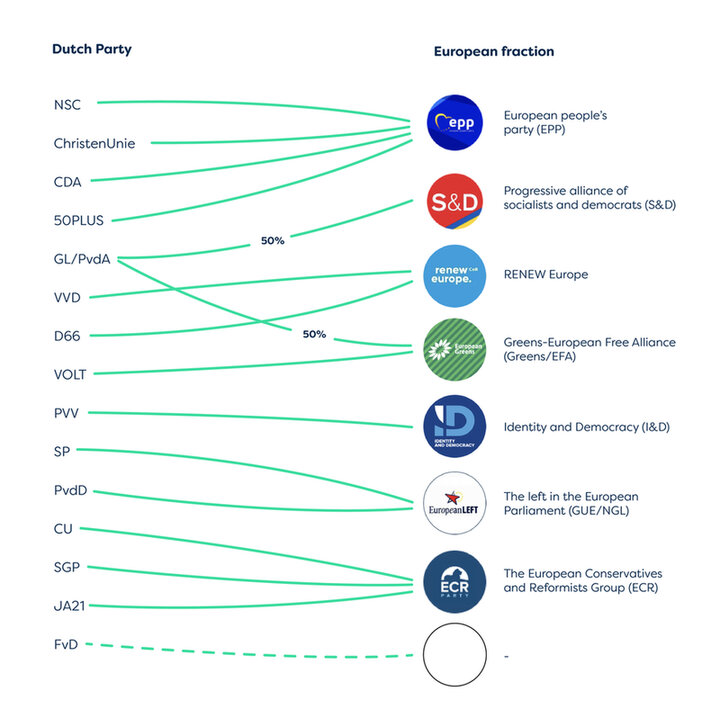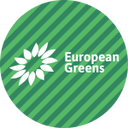Toolkit
on how to vote for the EU
The elections for the European Parliament are elections whose purpose many may not see, for an institution whose role and function few people really understand. Although voters often interpret the elections as a low-risk way to vent national frustrations, the election’ results will strongly impact the course of the European Union over the next five years. And this direction will directly affect your everyday life and work. In times of ongoing war and conflict, it becomes apparent that being able to vote should not be taken for granted; your vote is worth a lot and does matter. This toolkit helps you to understand how, where and who you can vote for.
Spy: a sharp turn to the right
Meloni, Orbán … Wilders? It does not come as a surprise that the polls showcase that the European Parliament will make a sharp turn to the right. Far-right parties are becoming increasingly dominant in national settings across many European capitals. The success of Geert Wilders’ Freedom Party (PVV) in the Dutch general election in November, or the national rallies in support of France’s regressive immigration bill in December, are two of the many examples that exist. The far right has played an important role in shaping European politics in 2023 and is likely to continue doing so in 2024, with early polls suggesting that a more right-leaning European Parliament will emerge.
What implications does a right-wing European Parliament have for you? It is important to note that the Green Deal, except for some elements like the climate law, is not legally binding but rather serves as a strategic framework for developing EU legislation. A right-wing European Parliament cannot simply withdraw the Green Deal. However, there may be room to relax climate targets. With a right-wing parliament, the Green Deal is likely to be less ambitious, less sustainable, and more conservative in its approach. This will impact the ongoing sustainable transition we are undergoing.
Analysis election programs
Overview
S&P works on four impact areas: Health, Agriculture, Food and Energy. We looked at all the election manifestos. This is an overview of the important positions in these areas of the European fractions.

Health

European People’s Party (EPP)
The EPP wants accessible quality healthcare for all citizens, irrespective of socio-economic status or where they come from. Reducing health inequalities should be the core mission of the EU, they say. For this purpose, the EPP finds it crucial to eliminate the pay gap to stop the drain of health professionals from some European regions, especially in rural areas. The EPP sees mental health as equally important and is committed to launching an EU Action Plan for Mental Health. While the EPP puts the well-being of people at the center of their actions, they also aim for the European Union to excel in healthcare innovations. The EPP strives to a future where practical policies and regulations support the development of top-quality medical advancements.

Party of European Socialists (S&D)
‘Covid-19 showed the essential contribution of the care sector to society, including hospitals, doctors, and nurses, and the importance of European cooperation against health threats,’ writes S&D in their manifesto for the EU elections. The S&D aims for a European Union that effectively coordinates cross-border pandemic responses while supporting and respecting public healthcare at the national level. The coalition supports collaborative European public research on vaccines and advocates for a strong European Mental Health Strategy. Additionally, they pledge to implement fair and transparent medicine pricing to prevent shortages and ensure timely access and innovation, especially for rare diseases.

Renew political group
Following their manifesto, RENEW Europe is committed to defending women’s rights and their access to sexual and reproductive health and rights, including abortion, and combating gender-based violence. The topic of health is not defined as a priority in the rest of RENEW’s manifesto.

Party of the European Left
Fight poverty, not the poor! The European Left believes that advocating for universal and free access to healthcare is essential for social justice. This includes contraceptive services and safe abortion throughout the EU, guaranteed by EU primary law. Public resources should be used only to create and strengthen public health systems. Moreover, they prioritize integrating a feminist perspective into all their policies, including those concerning healthcare.

European Green Party (the Greens/EFA)
According to the European Green Party manifesto, health is considered a public good. They advocate for a European Health Union to ensure universal health coverage for all Europeans. The party aims to address health disparities and ensure access to affordable medicines and treatments, including those for cancer and rare diseases. Proposed European legislation would require all member states to provide universal health coverage. Additionally, the European Green Party suggests establishing an EU Health Force for health cooperation within the European Union. Mental health will also be part of the overall healthcare policy of the European Green Party.

European Free Alliance (The Greens/EFA)
Health is not a component of the European Free Alliance's manifesto.

Identity and Democracy Party (ID)
“No ID manifesto is planned, as our programme was already formulated when the group was founded in 2019 and in the Antwerp Declaration, from which our rejection of uncontrolled migration and excessive climate policy also stems,” ID group vice-president Gunnar Beck,” AfD MEP.
Alliance of Liberals and Democrats for Europe party
Health is not a central component of the manifesto of the Alliance of Liberals and Democrats for Europe Party. The coalition advocates for the digitalization and upskilling of the EU healthcare sector through public-private partnerships, but that is the extent of it. The coalition prioritizes environmental issues and sustainability.

European Conservatives and Reformists Party (ECR)
For the European Conservatives and Reformists party, climate change and public health are closely linked. The party recognizes the importance of addressing health issues as part of its approach to tackling climate change. They highlight the urgent need to improve air quality, which affects public health across borders and requires collaboration with EU neighbors. In Europe, the estimated annual health-related costs of air pollution range from 330 to 940 billion Euros.
Agriculture

European People’s Party (EPP)
The EPP manifesto underscores the significance of agriculture in Europe, aiming to support farmers and ensure the viability of rural areas. It advocates for a robust Common Agricultural Policy (CAP) with a stronger economic pillar and fair distribution of funds among Member States to support farmers and fishers amidst global challenges and declining farm numbers. The manifesto prioritises modern and sustainable agricultural practices, including precision agriculture, integrated pest management, and robotics. It emphasises the importance of technological innovation in achieving ambitious goals while maintaining competitiveness in global agriculture. Additionally, the manifesto highlights the need for rural development initiatives, support for disadvantaged rural areas, and access to land for young farmers.

Party of European Socialists (S&D)
The S&D manifesto prioritises strengthening the EU's common agricultural policy to support farmers, particularly young, women, small-scale farmers, and agricultural workers. It aims to protect farmers from unfair competition and price speculation while ensuring fair prices in the value chain. The manifesto underscores the importance of securing farmers' incomes and jobs, enabling them to provide healthy and affordable food for all. It advocates for improving food production through sustainable farming practices, reducing pesticide use, improving soil management, and protecting biodiversity. The S&D emphasises the need for financial and technical support to help farmers transition to environmentally friendly farming methods and rejects the notion that sustainability is detrimental to farmers' interests.

Renew Political Group
Renew Europe Now prioritises supporting and empowering farmers while acknowledging their vital contribution to food sovereignty and security. The manifesto rejects attempts to portray farmers as enemies of climate action and instead proposes measures to simplify their lives and promote sustainable farming practices. It aims to bridge the gap between environmental concerns and agricultural interests by highlighting climate change as the primary threat to harvests. Renew Europe Now advocates for respecting farmers' expertise and autonomy, offering tangible proposals to streamline bureaucratic processes and facilitate their transition to more sustainable farming methods. By fostering cooperation and mutual respect, the manifesto aims to ensure a thriving agricultural sector that benefits both farmers and citizens alike.

Party of the European Left (The Left)
The Left manifesto proposes a transformation of the EU's Common Agricultural Policy towards environmentally sustainable practices. It advocates for redirecting funds towards small, sustainable farms and labour-intensive agriculture to support those who work the land. Additionally, it calls for the integration of biodiversity into all sectoral policies and the establishment of an agro-ecological policy model for the CAP. The Left emphasises the importance of promoting fair incomes for farmers while ensuring soil protection, mitigating climate change, and enhancing food sovereignty through sustainable agricultural practices.

European Green Party (The Greens/EFA)
The Greens advocate for a transformation of agriculture towards sustainable, organic practices to address climate change, biodiversity loss, and fair remuneration for farmers. They propose redirecting subsidies away from industrial agriculture reliant on pesticides and monocultures towards organic farming and agroecological production. Emphasizing soil health and reducing emissions, they seek to promote resilient and socially just agricultural models. This entails dedicating one-third of the EU budget to sustainable food systems, improving soil quality, and reducing emissions. They aim to transition towards plant-based diets and reduce pesticide use by 50% by 2030. The Greens oppose GMOs, advocate for stricter animal welfare regulations and support measures to end cruel farming practices, transport, and the exotic pet trade.

Identity and Democracy Party (ID)
“No ID manifesto is planned, as our programme was already formulated when the group was founded in 2019 and in the Antwerp Declaration, from which our rejection of uncontrolled migration and excessive climate policy also stems,” ID group vice-president Gunnar Beck,” AfD MEP.
Alliance of Liberals and Democrats for Europe Party
ALDE Party prioritises reforms in the Common Agriculture Policy (CAP) to reduce bureaucratic burdens for farmers and support sustainable food production while respecting biodiversity and animal welfare. They propose introducing new rules for genetically engineered crops, sharing data, fostering innovation, and investing in breakthrough technologies to address climate change effects and safeguard biodiversity. Additionally, ALDE emphasises upskilling key professions in agriculture to accelerate the digital transition and increase competitiveness.

European Conservatives and Reformists Party (ECR)
The ECR Group focuses on addressing urgent public health issues like poor air quality, emphasising the need for clean air in Europe. They lead efforts to set new air quality standards, aligning targets with international commitments and aiming for ambitious reductions in emissions by 2030. The group highlights the significant health and economic benefits of improving air quality, including reduced healthcare costs, crop yield loss, and damage to buildings.
Food

European People’s Party (EPP)
The EPP manifesto prioritises food security, quality, and affordability, advocating for fair prices and support for farmers. It emphasises the importance of rural areas and aims to preserve unique landscapes while addressing climate resilience and biodiversity. The manifesto seeks to strengthen the economic pillar of the Common Agricultural Policy (CAP), ensuring fair distribution of funds and incentivising environmental efforts. It promotes modern agricultural practices and high-tech solutions, aiming for sustainable food production and reducing reliance on imports. Additionally, the manifesto highlights the need to consider consumer and farmer interests in policy development, streamline regulations, and enhance the use of biotechnologies to mitigate climate-related risks.

Party of European Socialists (S&D)
The S&D manifesto pledges to secure food sovereignty and protect people's health through sustainable agriculture. It emphasises fighting plastic and chemical pollution, ensuring efficient water management, and protecting species diversity and animal welfare. The manifesto aims to provide healthy and affordable food for all by improving food production through sustainable farming and fishing practices.

Renew Political Group
Renew Europe Now emphasises the symbiotic relationship between climate and farming, rejecting polarising narratives that pit climate activists against farmers. Renew Europe Now advocates for respecting and supporting farmers, allowing them to focus on farming rather than bureaucratic paperwork. By fostering collaboration and understanding between all stakeholders, the manifesto seeks to ensure a sustainable and secure food supply for all citizens.

Party of the European Left
The Left Manifesto prioritises food sovereignty and quality, advocating for environmentally friendly, sustainable agriculture that promotes healthy food with short commercial circuits. It emphasises the integration of biodiversity into sectoral policies, including energy, fisheries, and land-use planning, to safeguard food sources. Additionally, the manifesto calls for the cancellation of EU Free Trade Agreements with the Global South, aiming to promote fair trade and consumption of locally produced goods. The Left also supports the implementation of a European Basic Income Directive to ensure all citizens have access to basic needs, including food, housing, and energy, fostering social and environmental development.

European Green Party (The Greens/EFA)
The Greens advocate for a shift towards a sustainable, climate-friendly food system to ensure affordable, nutritious food for all while supporting fair remuneration for producers. They propose establishing the right to food in EU legislation, guaranteeing access to healthy food through dedicated social security mechanisms. Emphasising small and ecological farming, they aim to empower consumers to make informed choices and support local supply chains. Additionally, they call for measures to curb food price speculation, prioritise agroecological approaches, and align food and trade policies with global food sovereignty principles. The Greens prioritise promoting food sovereignty, local and regional food supply chains, and ensuring imported food products meet international and EU standards.

European Free Alliance
The Greens advocate for a shift towards a sustainable, climate-friendly food system to ensure affordable, nutritious food for all while supporting fair remuneration for producers. They propose establishing the right to food in EU legislation, guaranteeing access to healthy food through dedicated social security mechanisms. Emphasising small and ecological farming, they aim to empower consumers to make informed choices and support local supply chains. Additionally, they call for measures to curb food price speculation, prioritise agroecological approaches, and align food and trade policies with global food sovereignty principles. The Greens prioritise promoting food sovereignty, local and regional food supply chains, and ensuring imported food products meet international and EU standards.

Identity and Democracy Party (ID)
“No ID manifesto is planned, as our programme was already formulated when the group was founded in 2019 and in the Antwerp Declaration, from which our rejection of uncontrolled migration and excessive climate policy also stems,” ID group vice-president Gunnar Beck,” AfD MEP.
Alliance of Liberals and Democrats for Europe Party
ALDE Party advocates for keeping food affordable, securing food systems, and promoting rural development. They aim to support consumers and farmers in adapting to sustainable practices while mitigating climate change challenges. The party emphasises the importance of adopting sustainable food systems to safeguard biodiversity and natural resources while fostering economic growth.

European Conservatives and Reformists Party (ECR)
The ECR Group advocates for sensible and sustainable measures regarding food quality and security without burdening businesses and Member States. They support an incremental approach to address issues like climate change, recycling, waste, emissions, and pollution, emphasising collaboration among EU nations. While not specifying food-related policies, they prioritise measures that support food security and quality without imposing unrealistic targets or costly regulations.
Climate

European People’s Party (EPP)
The EPP believes that the EU has has a leading role to play in global climate protection. They aim to develop a European Energy Union that will lead all Member States into a carbon-neutral and environmentally friendly future. One that places the economic, financial and social needs of citizens at the centre of the future energy supply. In addition to this, the EPP aims to lower electricity and gas prices for European citizens and businesses by further integrating the European energy market through investments. They advocate for a common European resource strategy to reduce dependency on other regions. “Lessons from conflicts like the Russian aggression against Ukraine emphasize the importance of clean energy for both environmental and security reasons,” is written in their manifesto.

Party of European Socialists (S&D)
Following the manifesto of S&D, social justice and climate justice are interconnected: the most vulnerable are paying the highest price for the climate emergency. Therefore, climate neutrality must be a force for social progress. The S&D will implement a Green Deal with a red heart, that allies social and ecological policies. In addition to this, the S&D will invest in renewable energy and energy efficiency, to be climate neutral by 2050. A key EU priority for the S&D is to combat energy poverty and reform the energy market to guarantee price stability and affordability.

Renew Political Group
RENEW Europe perceives the energy transition as an opportunity to enhance competitiveness. Earlier this year, the Renew Europe group unveiled 10-point plan outlining strategies to achieve this goal. The plan includes proposals to streamline processes for SMEs, reduce bureaucratic hurdles, decrease energy dependencies and enhance market access.

Party of the European Left (The Left)
The European Left beliefs that the energy transition does go beyond an industrial transformation: it relates to a societal transformation of how we produce and consume, adapted to the real needs of the population and to the limits of the planet. The manifesto of the European Left calls for immediate climate action. The coalition strives to increase the European target for reducing greenhouse gas emissions from 55% to 65% by 2030. Moreover, the date for the European Union’s climate neutrality should be brought forward from 2050 to 2035. To achieve this, the European Left aims to impose a windfall tax on excessive profits in the energy and war-related industries, such as banks.

European Green Party (The Greens/EFA)
While progress has been made towards a green transition, the European Green Party beliefs that there is an urgent need to expedite sustainability efforts without compromising living standards. The party insists that healthy and secure societies can only thrive if we respect our planet's limits. For the European Green Party, protecting the climate and environment goes hand in hand with ensuring people's well-being. They envision a future where a socially just and climate-neutral Europe not only guarantees prosperity but also fosters a healthier living environment. The party advocates for shifting investments from fossil fuels to renewable energy sources.

European Free Alliance (The Greens/EFA)
The European Free Alliance supports the targets of the European Green Deal to make Europe the world’s first carbon-neutral continent by 2050. However, regions and municipalities must have the flexibility to adopt their own strategies to achieve these commonly agreed targets: objectives identified in Brussels can be reached in different ways in different parts of Europe, taking account of the local needs and opportunities that each region knows best. The European Free Alliance does support the rapid expansion of renewable and low carbon energy projects, but these should be in harmony with local communities.

Identity and Democracy Party (ID)
“No ID manifesto is planned, as our programme was already formulated when the group was founded in 2019 and in the Antwerp Declaration, from which our rejection of uncontrolled migration and excessive climate policy also stems,” ID group vice-president Gunnar Beck,” AfD MEP.
Alliance of Liberals and Democrats for Europe Party
The ALDE coalition prioritizes the implementation of adopted energy and climate rules to reach EU targets and ambitions. The party pushes for the European Environmental Agency to become a fully operational authority, ensuring consistent implementation of environmental standards across the EU. ALDE emphasizes that climate change can be combated by reducing reliance on fossil fuels. Regarding the circular economy, the coalition aims to provide businesses with incentives to invest in and adopt sustainable production through diversification, reuse, and repair.

European Conservatives and Reformists Party (ECR)
The European Conservatives and Reformists party finds it important to adopt sustainable measures to address various environmental issues, such as climate change, recycling, waste management, emissions reduction, and pollution control. They advocate for an approach that avoids imposing unnecessary costly burdens on businesses and member states, while still being ambitious and effective.